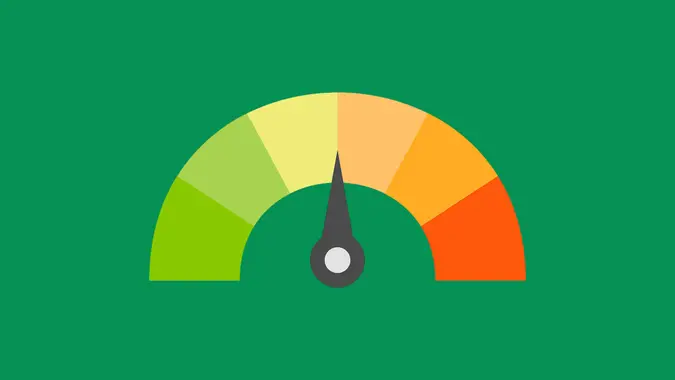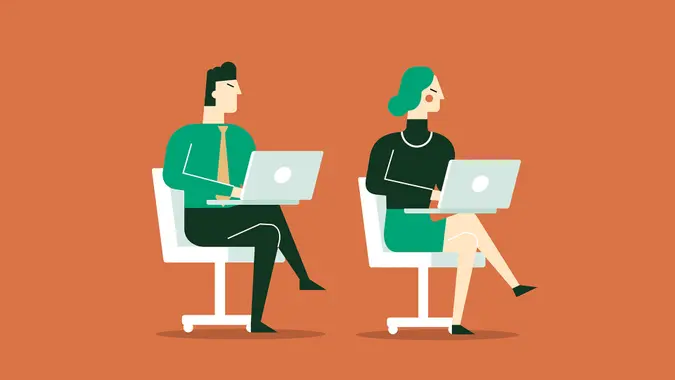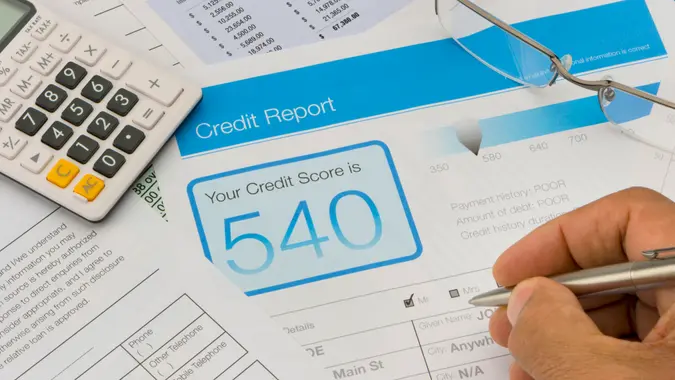What Is a Credit Report and How Is It Different from a Credit Score?

Commitment to Our Readers
GOBankingRates' editorial team is committed to bringing you unbiased reviews and information. We use data-driven methodologies to evaluate financial products and services - our reviews and ratings are not influenced by advertisers. You can read more about our editorial guidelines and our products and services review methodology.

20 Years
Helping You Live Richer

Reviewed
by Experts

Trusted by
Millions of Readers
Applied for a credit card or an auto loan? Then you’re likely familiar with these two words — credit report. You may be asking, “What is a credit report?” and wondering what bearing it has on your financial transactions. Turns out, a credit report will likely impact small and big financial decisions.
Whether you are applying for a new loan, getting a job or renting an apartment, lenders and landlords will look at your credit report. A credit report helps to evaluate how good you are with your credit.
What Is a Credit Report?
A credit report is a detailed history of how you have used your credit. It lists all of your accounts and payment information, as well as any collection or bankruptcy instances.
Three credit bureaus collect and maintain your credit history. Those bureaus are Experian, Equifax and TransUnion.
Lenders, landlords and even some employers may check your credit report to decide if they want to approve you.
What Information Is Included in a Credit Report?
Your credit report contains several pieces of private information about you. The report contains the following:
- Personal information: Your credit report has your name, address, Social Security number and birth date.
- Credit accounts: The credit report has a list of your credit cards and loans. There is a detailed history of these accounts including whether payments were on time, late or missed.
- Credit inquiries: A list of companies that checked your credit when you applied for loans or credit cards will be included in your credit report.
- Public records and collections: Any bankruptcies, foreclosures and unpaid bills sent to collections will also be listed on your credit report.
How Is a Credit Report Different From a Credit Score?
Your credit report determines your credit score. Here’s a look at their differences:
| Feature | Credit Report | Credit Score |
|---|---|---|
| Definition | Full history of your credit accounts | -Three-digit number that sums up your credit health -Based on your credit history |
| Purpose | Shows your borrowing and repayment history | Summarizes your credit risk |
| What It Includes | Accounts, payment history, balances, inquiries, public records | Derived from credit report data (e.g., payment history, use of credit) |
| Who Uses It | Lenders, landlords, employers, insurance | Primarily lenders and creditors |
| Update Frequency | Updated regularly as lenders report new activity | Can change frequently based on credit history |
Key Takeaway
Your credit score is calculated based on the data in your credit report.
Why Is Your Credit Report Important?
Your credit report is important in your day-to-day financial transactions and also when you buy a home or car.
- Lenders use your credit report to decide if they will approve or deny you for a loan or credit card. If they do decide to extend you credit or approve you for a loan, your credit report determines your interest rate.
- Landlords may decide to check your credit report before you can rent an apartment.
- In addition, certain employers, especially those who are hiring for financial roles, may check your credit report too.
- You can also use your credit report as a tool to monitor whether someone has opened a fraudulent account in your name.
How To Check Your Credit Report for Free
Did someone say free credit report? Yes, you can get a free credit report from each bureau once a year. You can get your free credit report from AnnualCreditReport.com.
Strategically it makes sense to request your credit report during different parts of the year so you know what’s going on with your credit from January to December.
Pro Tip
You might be entitled to additional free credit reports after a data breach has been reported. Also, some credit monitoring apps will show you parts of your credit report.
How To Read Your Credit Report
It’s important to double-check your credit report.
First, start with your personal information. Make certain your name is correct. Sometimes the credit report may also list a name similar to yours.
You always want to check the accounts listed on your credit report. Here is the specific information you want to review:
- Identify the accounts you don’t recognize. These could be fraudulent accounts.
- Make certain the payment history is correct.
- Check all balances and credit limits for accuracy.
Also, review any inquiries that have been made regarding your credit. Ensure you recognize all the companies that have checked your credit.
Lastly, check for items like collections or late payments.
What To Do if You Find a Mistake on Your Credit Report
What should you do if you notice wrong information on your credit report? You should address it immediately. Take the following steps:
- Step 1. Gather documentation that will prove a mistake has been made. It could be bank statements or payment confirmations.
- Step 2. File the dispute with the credit bureau (either Experian, Equifax or TransUnion) that shows the error.
- Step 3. All bureaus have 30 days to investigate and must remove the information they cannot verify.
Mistakes Happen — Fix Them Quickly
Act immediately when you notice an error. Fixing errors can improve your credit score quickly.
FAQ
Here are the answers to some of the most frequently asked questions about credit reports.- What is a credit report and why is it important?
- A credit report is a summary of your credit history, including loans, credit cards, payment history and balances. It's important because lenders, landlords and employers use it to assess your financial responsibility.
- How do I get my credit report for free?
- Visit AnnualCreditReport.com to get a free report from each of the three credit bureaus once a year.
- What's the difference between a credit report and a credit score?
- A credit report is a detailed history of your credit activity. A credit score is a three-digit number that is based on your credit report.
- How long does negative information stay on a credit report?
- Most negative items stay on your credit report for seven years. Bankruptcies can stay on your credit report for 10 years.
 Written by
Written by  Edited by
Edited by 






















